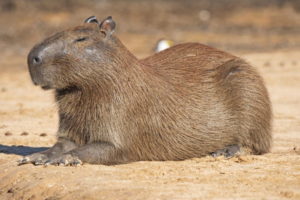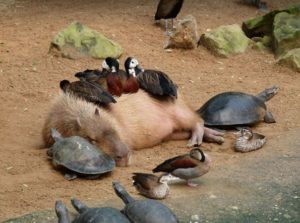lET US TELL YOU A BIT ABOUT OURSELVES
tHIS SPACE IS STILL UNDER CONSTRUCTION.
We are working on getting our new website completed. In the mean time, enjoy this information about Capybaras
Capybara’s are a rodent of unusual size being TWICE as big as the beaver. They can usually be found in Northern and Central South America, but a small group of them took a vacation to Florida and decided to stay. ( They call them an ” invasive species ” in Florida. ) Capies are strong swimmers with partially webbed feet and fur that dries off quickly. They enjoy living alone and in groups of up to 40. They also eat their poop first thing in the morning.


Poop eaters
Capybaras eat their poop first thing in the morning. It sounds gross but it is rich in proteins thanks to all the microbes digested the day before. Due to the Capy’s diet, their food doesn’t fully digest the first time around. Eating it again allows them to digest the food a second time and squeeze even more nutrients out of it.

A Friend to all
Capybara’s are pretty chill with most other animals. They are often seen giving small monkeys or other small animals a lift across the water, or casually lounging with a bird perched on their head.

Once Deemed a Fish
When Catholic Spanish missionaires began colonizing Venezuela in the 1700s, they were confused by this water loving creature. They wrote to the Pope back in Europe, asking if Capy’s could be eaten during Lent, which was to be meat-free. Based on their description, and the pope having never seen a Capybara, he decalred them a fish and therefore able to be eaten during Lent.